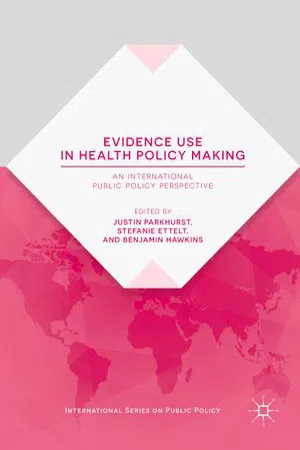About this book
This open access book provides a set of conceptual, empirical, and comparative chapters that apply a public policy perspective to investigate the political and institutional factors driving the use of evidence to inform health policy in low, middle, and high income settings. The work presents key findings from the Getting Research Into Policy (GRIP-Health) project: a five year, six country, programme of work supported by the European Research Council. The chapters further our understanding of evidence utilisation in health policymaking through the application of theories and methods from the policy sciences. They present new insights into the roles and importance of factors such as issue contestation, institutional arrangements, logics of appropriateness, and donor influence to explore individual cases and comparative experiences in the use of evidence to inform health policy.
Frequently asked questions
- Essential is ideal for learners and professionals who enjoy exploring a wide range of subjects. Access the Essential Library with 800,000+ trusted titles and best-sellers across business, personal growth, and the humanities. Includes unlimited reading time and Standard Read Aloud voice.
- Complete: Perfect for advanced learners and researchers needing full, unrestricted access. Unlock 1.4M+ books across hundreds of subjects, including academic and specialized titles. The Complete Plan also includes advanced features like Premium Read Aloud and Research Assistant.
Please note we cannot support devices running on iOS 13 and Android 7 or earlier. Learn more about using the app.
Information
Table of contents
- Preface
- Acknowledgements
- Contents
- Chapter 1: Studying Evidence Use for Health Policymaking from a Policy Perspective
- Chapter 2: The Many Meanings of Evidence: A Comparative Analysis of the Forms and Roles of Evidence Within Three Health Policy Processes in Cambodia
- Chapter 3: The Role of Evidence in Nutrition Policymaking in Ethiopia: Institutional Structures and Issue Framing
- Chapter 4: The Use of Evidence in Health Policy in Ghana: Implications for Accountability and Democratic Governance
- Chapter 5: Using Evidence in a Highly Fragmented Legislature: The Case of Colombia’s Health System Reform
- Chapter 6: The Politics of Evidence Use in Health Policy Making in Germany: The Case of Regulating Hospital Minimum Volumes
- Chapter 7: Electronic Cigarettes Regulation in the UK: A Case Study in Evidence Informed Policy Making
- Chapter 8: Ministries of Health and the Stewardship of Health Evidence
- Chapter 9: Evidence Use and the Institutions of the State: The Role of Parliament and the Judiciary
- Chapter 10: Evidence and Policy in Aid-Dependent Settings
- Chapter 11: Conclusion: Reflecting on Studying Evidence Use from a Public Policy Perspective
- Index
